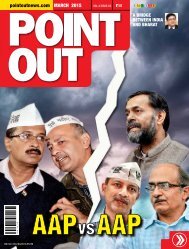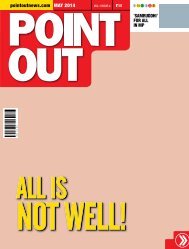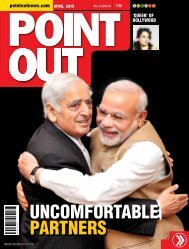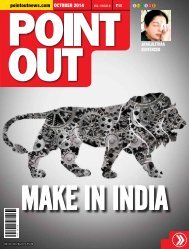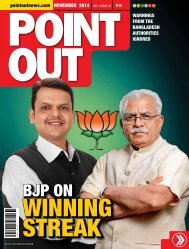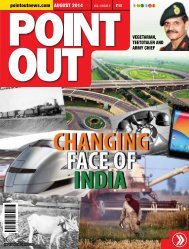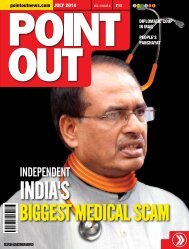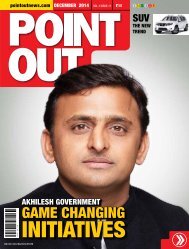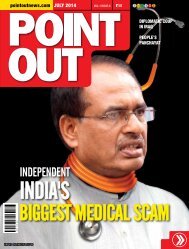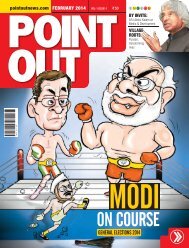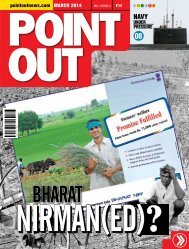Create successful ePaper yourself
Turn your PDF publications into a flip-book with our unique Google optimized e-Paper software.
Point<br />
Out<br />
BY INVITE<br />
MSME : LIFE LINE OF<br />
ECONOMY<br />
If we take a look globally, MSME density is the highest in<br />
Brunei, Indonesia and Paraguay (as per research figures in<br />
2010-2011) with economies having higher per capita GDP<br />
witnessing more formalized MSME structures and support per<br />
1000 people, Thereby business density having a positive<br />
correlation with per capita income.<br />
»»<br />
MEENAKSHI LEKHI<br />
W<br />
hen<br />
making economic<br />
choices, would you choose<br />
to expand the tax base from<br />
6% to a much larger number,<br />
create enterprise and jobs worth several<br />
crores and ensure financial credit reaches<br />
serious industry? Or would you support<br />
status quo?<br />
As we get into a phase of development,<br />
whether political or economics, but the<br />
choice to support and aid development is<br />
one that determines our actions – and one<br />
of the most crucial industries or sectors<br />
that comes into the picture are Micro,<br />
Small and Medium Enterprise. They are<br />
the lifeline of any economy that is looking<br />
at well-rounded, fast paced and holistic<br />
development as it ushers in new growth<br />
targets and a new dawn.<br />
As per the MSME Development Act of<br />
2006, MSME’s in India were identifiable<br />
solely on initial investment – with different<br />
figures for services and manufacturing. A<br />
micro enterprise is defined as one with an<br />
initial investment of under 25 lacs INR for<br />
manufacturing and under 10 lacs INR for<br />
services. A small enterprise is one with an<br />
investment between 25 lacs and 5 crores<br />
specifically for manufacturing while a<br />
medium enterprise is between 5 and 10<br />
crores. If we take a look globally, MSME<br />
density is the highest in Brunei, Indonesia<br />
and Paraguay (as per research figures<br />
in 2010-2011) with economies having<br />
higher per capita GDP witnessing more<br />
formalized MSME structures and support<br />
per 1000 people, Thereby business density<br />
having a positive correlation with per<br />
capita income.<br />
New Definitions<br />
To create conditions where MSMEs in<br />
India come up to world standards of<br />
efficacy and get the necessary support,<br />
definitions must be looked into going<br />
ahead. Unlike the Indian framework,<br />
EU identifies MSMEs based on turnover<br />
with a check on number of employees.<br />
In such a scenario, an interesting statistic<br />
in the European Union is that 99% of<br />
all enterprise are MSME’s, with the<br />
absolute count at over 20 million. As per<br />
EU standards, micro enterprises have<br />
under 10 employees and upto 16 crore<br />
Euro turnover, small have less than 50<br />
employees with an increased turnover<br />
of under 80 crores Euro and the number<br />
becomes 250 employees and upto 344<br />
crores in the case of Medium Sized.<br />
One look at our neighbour China and<br />
their MSMEs drive 80% of all employment<br />
within the country. India’s statistics on<br />
this are in the gray area with only 6% of<br />
Indians as pan card holders, 3% as tax<br />
paying and a large unregistered set-up<br />
where basics such as electricity, microcredit<br />
and research support cannot make<br />
it to the micro and small enterprises.<br />
Catalog – for best interest of Govt<br />
and MSME<br />
A catalog is essential from the government’s<br />
point of view to create a database that<br />
may then be intelligently studied with<br />
appropriate changes put forward in the<br />
best manner. As per a business article<br />
dated 3rd June <strong>2014</strong>, India has one of the<br />
24<br />
september <strong>2014</strong>





